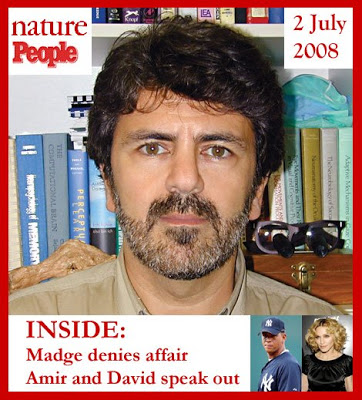Shmuel and Leopard [sic] issued a statement to Nature in which they say: “We are confident, and rigorous peer review agreed, that the data we collected are appropriate for studying spontaneous activity and the resting state in the brain. We stand by the conclusions we made in our paper.”
Nature People
Neuroscientist: my data published without authorization are 'misleading'

On the heels of the open access debate instigated by Declan Butler's recent article in Nature, and after the canonization of St. Logothetis by a number of neurobloggers (this one included), David Poeppel has informed us that the Nature Publishing Group has started an exciting new journal, Nature People. And the first featured science celebrity is none other than Dr. Logothetis himself. Dr. Poeppel offers his opinion on the fledgling publication:
I recommend as reading a piece on the sociology of science and scientific conduct that just came out in Nature. The article tells the embarrassing saga of a dataset acquired by two former Logothetis trainees and published in the journal Human Brain Mapping this past May. . . . .The two authors should not have proceeded to the publication stage without involving the PI much more closely, given the origin of the data; the PI should show more perspective and coolitude and chillaxity (both closely related to Stephen Colbert's truthiness) -- and write a calm and carefully argued response, if the stakes are really that high; the journal Human Brain Mapping should have allowed time for a published response, given that that is not uncommon for journals...; Nature should not write about this -- unless this is NPG's new Nature People (nobody wins with this type of hype, I bet).Here's an excerpt of the actual news story in Nature:
What about the authors?Max Planck researchers charged with misusing data
by Alison AbbottThe director of a top laboratory in Germany has charged that two of his former research students took data from his laboratory without his permission and published scientifically incorrect interpretations of them against his advice.
Neuroscientist Nikos Logothetis (pictured), of the Max Planck Institute for Biological Cybernetics in Tübingen, further claims that the journal involved, Human Brain Mapping, acted incorrectly by publishing the paper after he told them the data were inappropriate. He says the journal has denied him the right to a timely reply.
One of the two editors-in-chief of Human Brain Mapping, Peter Fox of the University of Texas Health Science Center in San Antonio, told Nature that the paper was correctly refereed, but declined to add details.
Logothetis is furious about the publication of data, which he believes will mislead the field, and about the fact that the authors of the paper allege that he tried to stop them publishing the data for personal reasons.
Neuronal correlates of spontaneous fluctuations in fMRI signals in monkey visual cortex: Implications for functional connectivity at rest
Human Brain Mapping
Volume 29, Issue 7, Date: July 2008, Pages: 751-761
Amir Shmuel, David A. Leopold
Abstract | References | Full Text: HTML, PDF (1257K)
The incident does raise serious issues of data "ownership" (Logothetis granted the duo permission to use the data, but reneged at a later date), authorship (the first author allegedly "invited Logothetis to join as third author, telling him that the paper had already been accepted for publication and would appear online in a few days"), and "jurisdiction" (What's the proper role of the research institution? Did Logothetis have the right to tell Peter Fox how to run his journal?).
What do you think? How could such a major public imbroglio have been averted?
Take the poll at Talking Brains.
For a given project that a PI starts with one or more students/postdocs, should author order be determined, and other publication issues be settled at the outset of the project?

 Nature People... Look for it on a newsstand near you! (or near the lengthy checkout line in the grocery store where there's only one cashier for a disgruntled group of 17 customers).
Nature People... Look for it on a newsstand near you! (or near the lengthy checkout line in the grocery store where there's only one cashier for a disgruntled group of 17 customers).
- The Special Issue Spotter
We trawl the world's journals so you don't have to: Anxiety disorders (Clinical Psychologist). Open-access journal publishing in psychology (Psychological Inquiry). open access Resilience in child development (The Journal of Child Psychology and...
- The Pre-registration Challenge
Open Science Framework - There have been no registrations. A number of scientists have been vocal proponents of study pre-registration, in which detailed methodological and statistical plans for an experiment are registered in advance of data collection....
- Lax Editorial Standards At Nature Neuroscience?
You be the judge... Editorial Nature Neuroscience - 10, 1 (2007) Setting the record straight The discovery of serious errors in two recent papers in the journal leads to lessons for authors, referees and editors. . . . The first correction involves a...
- Peer Review Trial And Debate At Nature
Omni Brain links to a new feature at Nature: a 3 month trial period of "open" peer review. For those who opt to submit their papers under this track, authors can choose to have their submissions posted on a preprint server for open comments, in parallel...
- Functional Brain Mapping
The current issue of the journal Human Brain Mapping is a special-topic issue: Special Issue: Meta-Analysis in Functional Brain Mapping . Issue Edited by Peter T. Fox, Angela R. Laird, and Jack L. Lancaster. Human Brain Mapping, Volume 25, Issue 1 (May...
